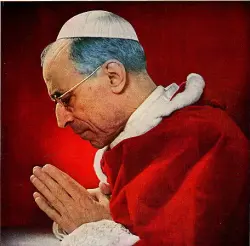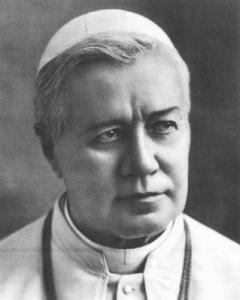Pope Celestino Ratzinger, Explained

As Benedicts approaches the grave, and after I received a comment on the other blog post from the reader Aqua, I would like to say two words on how I see the position in which Benedict has put himself with his abdication and his strange choice of title.
Benedict is a very well educated man. He is, also, very grounded in the Italian cultural environment. He knows that in Italy – other than in other Countries – to be a Celestino is another way of saying to be a coward. It really is a language usage well spread among the educated, who know their Dante.
Benedict knows his Dante, and he knows his Italians. He did not want to be a Celestino (though, let us be frank, he actually is). Being quite a cerebral guy, and wanting to abdicate without looking like a coward, he decided to keep the title Emeritus, using another language usage that every Italian knows from, say, university professors.
A Professor Emeritus does not have the job anymore. He is retired. But he has not run away. He is simply too old to keep doing his job, but he keeps the dignity of the office, which he does not want to be seen as simply discarding.
In Benedict’s very intellectual world, this makes him a guy who – like the Professor – does not cowardly retreats, but decides to simply pass the baton to a healthier, stronger Pontiff; who is then, clearly, the Pontiff, exactly in the same way as the Professor Emeritus does not have the job anymore, it’s the new guy who has it.
Why does Benedict does all this? Why does he just not abdicate, takes a title he already had (Bishop, Cardinal, Priest!), and asks a monastery of his choice to host him for the rest of his life? At the root of it all, I think the answer is: vanity, and concern for his legacy and reputation.
However, a guy like Benedict would have some excuses for his vanity. He likely reasoned that, upon becoming a Pope, he was not a cardinal anymore. He had the title of bishop, but without a diocese. He could have been Father Benedict, but again I think he was just too vain for that. Plus, all these titles, and the correspondent attire – purple, or black – would have reminded him every day that he has abandoned his post, for fear of the wolfs.
This is not what a Benedict does. A Benedict makes excuses for his lack of courage – like he did in his eight years as Pope: not going decisively against the homo lobby, allowing Summorum Pontificum to be largely neglected, and appointing horrible bishops all the way for the sake of a quiet life – and finds ways to justify his dereliction of duty. Hence the white tunic, the Emeritus title, and all the mess that ensued.
It must be said that, if the new Pope had been Pius XIII, nobody would be talking of Benedict now, unless to remember what improvement the conclave brought.
I have often made the comparison – known to everybody in Italy because of Manzoni – between crock vases and iron vases. Benedict is a crock vase all right. But he is a very intelligent, learned, cerebral crock vase, who will find one thousand excuses not to be the iron vase that is, actually, written in blood letters in the job description of a Pope.
Ultimately, Benedict failed in this as he failed in so many other things as a Pope.
He should know by now that he will forever remembered, in Italy and elsewhere, as a Celestino.
Posted on August 11, 2022, in Bad Shepherds, Catholicism, Conservative Catholicism, Traditional Catholicism and tagged Pope Benedict XVI. Bookmark the permalink. 7 Comments.




















What you described, and I happen to agree with it 100%, is substantial error which, according to Canon Law (188), invalidates the resignation “by the law itself”.
All his false views put together mean nothing more than that he was, and is, and will forever remain – in substantial error. Which renders him the Pope … who remains in error. And we all suffer from it.
The difference between Benedict XVI and Celestine is that Celestine abdicated, clearly, visibly, quantifiably, legally, ontologically. Whereas Benedict remains Pope in all the same ways. He can’t do, as you say here, what he clearly tried to do. But it is impossible because God ordained one who must remain until death or legal, ontological abdication from the Office.
Absent which is why, as you would expect in a Church built on the invisible but Divine connection that runs through the Holy Father, Peter, Rock – confusion, degradation, destruction and debauchery now reign supreme. And a false Pope who is, as you accurately define him, Evil Clown and not Holy
Father.
We may still disagree on conclusions, (which all my various Priests over the past years have agreed – I have discussed this with them all – is permissible within the Catholic Faith), but I agree with your premise.
This is absurd, Aqua.
You don’t get to decide whether he is in error or not.
He was the Pope, and he has decided to abdicate, and he has very well said so, and he has very well done so, and a new conclave took place, and anew guy was elected. Of whom not one single cardinal said he was illegitimately elected.
You need to accept reality.
I admit that I have never cared for Benedict: he was so much exemplified by those university professors who KNEW that they were smarter than anyone else, and they had written books to prove it. It was alright for him to break the rules, but he didn’t appreciate it when underlings decided to do so. I appreciated that he brought some formatlity (and respect!) back to Rome. That may have been an important consideration for many converts. The Catholics didn’t look like the heretics. They looked like they took themselves seriously.
And that ended abruptly with his abdication.
I think your explanation for why Ratzinger assumed the title Emeritus and retains the trappings of office is quite plausible. Coupled with this is the fact that we simply don’t have a protocol for dealing with an ex-Pope (except maybe to put him in prison, like Celestine V). This is why I am unconvinced by the Beneplenist theorists that the retention of papal trappings means Ratzinger failed validly to abdicate. This evidence just doesn’t deserve the weight that these people give it.
That said, I do not doubt that Ratzinger had, and has, some eccentric notions about the papacy. It has to be admitted that he is not free of the modernist taint. I myself failed to notice this during his reign, because he was still orders of magnitude more orthodox than a lot of other prelates, and because he was so hated by liberal churchmen. But his failure to exercise his real power as Pope to correct the Church’s course proves how crippled he was by modernism, and by the belief that the novelties of Vatican II can co-exist with the Catholic Faith. Pope Francis, at least, has done us the inestimable service of proving the impossibility of this coexistence.
None of this, meanwhile, has any effect on Christ Himself, Who confers the papal office and takes it away again, and is not stymied by the errors and semantics games of men.
“This evidence just doesn’t deserve the weight that these people give it”.
This “evidence” is just not evidence of anything. Ratzinger said himself he wanted to abdicate. They climb on mirrors because they want to.
Mundabor said: “You don’t get to decide whether he is in error or not.”
Actually, I do. No less than you do … *all the time* … in judging the actions of the Evil Clown; granting him the title itself instead of his proper title (if he were Pope) “Holy Father” itself, which is proof you, yourself, decide what is and is not error. Your whole blog is largely dedicated to this activity – pointing out (rightfully) error and judging it for what it is. And I am in agreement with you, that this is not just proper but required of the Faithful.
We see a murder (for instance) we need not wait for a Court of Law to confirm what it was we saw – he pulled a gun and shot the man in cold blood (for instance). We can’t judge the action legally; can’t take personal vengeance. We can (must) act as witness for the Court and let the legal system confirm and then judge in its own time and way.
There is no such thing as “Pope Emeritus”. A Pope cannot “retire”, but still “remain firmly and forever within the enclosure of St. Peter” … alongside all the other Popes who choose to do so in the future. That is obviously true, given there has never been one – EVER. I need sources and methods to justify the deviation from Sacred Tradition.
Your blog is largely dedicated to pointing out error – error that is almost universally supported by Cardinals and the world’s Bishops. This is a big one. Canon 188 and 332 specifically define the error (“by the law itself”). And most importantly, Sacred Tradition stands against the unsupported deformation/innovation – the fruits of which are blatantly obvious.
A murder is different from who is Pope.
I do not “decide” that the Pope is Pope by calling him Holy Father (which I seldom do, by the way).
I call him the Pope *because the Church says so*.